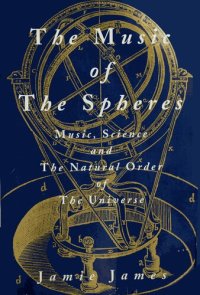
Ebook: The music of the spheres: Music, science, and the natural order of the universe
Author: Jamie James
- Genre: Science (General) // Science of Science
- Tags: music of the spheres, science history
- Year: 1995
- Publisher: Copernicus
- City: New York
- Language: English
- pdf
This book provides the parallel histories of music and science, from celestial harmony to cosmic dissonance. For centuries, scientists and philosophers believed the universe was a stately, ordered mechanism -- mathematical and musical. The smooth operation of the cosmos created a divine harmony (perfect, spiritual, eternal) which composers sought to capture and express. With The Music of the Spheres, readers will see how this scientific philosophy emerged, how it was shattered by changing views of the universe and the rise of Romanticism, and to what extent (if at all) it survives today. From Pythagoras to Newton, Bach to Beethoven, and on into the twentieth century, it is a spellbinding examination of the interwoven fates of science and music throughout history. - Back cover.
Can music that springs from our 20th-century acceptance of the chaotic nature of reality ever attain the heavenly heights of its Romantic predecessors from an age of order? In The Music of the Spheres Jamie James asks this question, contrasting the importance of music to life before the Industrial Revolution with its value now, when we see it more as entertainment than nourishment. Now that chaos and unpredictability prevail, James wonders, what place can the music of the spheres have for the average person? In the absence of certainty, where is the faith that inspired the Romantic classics? Is not the sound of cynicism unedifying . . . are we beyond beauty? As William Burroughs observed of our age, ‘Nothing is true, everything is permitted’, and this breakdown in music, order and the aesthetic sense suggests that perhaps we are out of key with the cosmos, in rebellion against the sacred, and so loosed from the ground of being, unable to make our art sing while our souls lament. Could the rejection by our arts and sciences of Romantic sentimentalism be anger at our own dissociation from the divine?
Founder of Discover magazine James explores the genesis of sacred and profane music by examining the work of the great artists and scientists, and shows how our understanding of the riddles that confront us has robbed us of our musical treasure by making nonsense of primitive, ancient theism. It is his premise that the physicists’ search for order in the quantum world and Freud’s ordering of the psyche reflect the deterministic wisdom of the Pythagoreans, and that the 20th-century classical composers from Igor Stravinsky, John Cage to Philip Glass expose the gap we inhabit, between gnosis and psychosis.
Zen, so dear to the late John Cage, teaches ‘when something is fulfilled, Heaven strikes it’. James says that perhaps our existential troughs have trapped and strangled our ability to return to an innocence sufficient to the task of creating music of the spheres. However, it is equally possible that we postmodernists, digi-talising ‘natural’ sounds, are aware that the spheres are in a way empty and it is the inner, not outer, spaces of our being where the music arises and disappears regardless of its manifestation.
Can music that springs from our 20th-century acceptance of the chaotic nature of reality ever attain the heavenly heights of its Romantic predecessors from an age of order? In The Music of the Spheres Jamie James asks this question, contrasting the importance of music to life before the Industrial Revolution with its value now, when we see it more as entertainment than nourishment. Now that chaos and unpredictability prevail, James wonders, what place can the music of the spheres have for the average person? In the absence of certainty, where is the faith that inspired the Romantic classics? Is not the sound of cynicism unedifying . . . are we beyond beauty? As William Burroughs observed of our age, ‘Nothing is true, everything is permitted’, and this breakdown in music, order and the aesthetic sense suggests that perhaps we are out of key with the cosmos, in rebellion against the sacred, and so loosed from the ground of being, unable to make our art sing while our souls lament. Could the rejection by our arts and sciences of Romantic sentimentalism be anger at our own dissociation from the divine?
Founder of Discover magazine James explores the genesis of sacred and profane music by examining the work of the great artists and scientists, and shows how our understanding of the riddles that confront us has robbed us of our musical treasure by making nonsense of primitive, ancient theism. It is his premise that the physicists’ search for order in the quantum world and Freud’s ordering of the psyche reflect the deterministic wisdom of the Pythagoreans, and that the 20th-century classical composers from Igor Stravinsky, John Cage to Philip Glass expose the gap we inhabit, between gnosis and psychosis.
Zen, so dear to the late John Cage, teaches ‘when something is fulfilled, Heaven strikes it’. James says that perhaps our existential troughs have trapped and strangled our ability to return to an innocence sufficient to the task of creating music of the spheres. However, it is equally possible that we postmodernists, digi-talising ‘natural’ sounds, are aware that the spheres are in a way empty and it is the inner, not outer, spaces of our being where the music arises and disappears regardless of its manifestation.
Download the book The music of the spheres: Music, science, and the natural order of the universe for free or read online
Continue reading on any device:

Last viewed books
Related books
{related-news}
Comments (0)